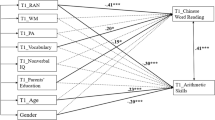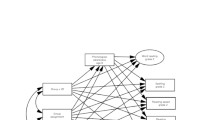Abstract
The purpose of this study was to assess the contributions of specific components of verbal and nonverbal working memory and of phonological awareness to the prediction of reading achievement. One hundred and three children from grades 1, 2, and 3 were administered a measure of phonological awareness, four measures of working memory, four measures of academic achievement, and a measure of verbal intelligence. Separate multiple regression analyses controlling for the effects of age, sex and verbal intelligence showed that tests of verbal memory and of direct recall significantly predicted reading and spelling achievement whereas tests of backward recall significantly predicted only pseudoword identification. Phonological awareness was also found to relate significantly to reading and spelling achievement even when working memory was partialled out. Thus, phonological awareness and measures of working memory predicted specific and significant amounts of variance in reading and spelling achievement. Further, none of these measures were specifically related to arithmetic achievement. The specific roles of phonological awareness and working memory in reading development are examined in the discussion.
Similar content being viewed by others
References
Adams, M.J. (1990). Beginning to read: Thinking and learning about print. Cambridge, MA: MIT Press.
Baddeley, A. (1992). Is working memory working? The Fifteenth Bartlett Lecture, The Quarterly Journal of Experimental Psychology 44A: 1–31.
Bruck, M. & Treiman, R. (1990). Phonological awareness and spelling in normal children and dyslexics: The case of initial consonant clusters, Journal of Experimental Child Psychology 50: 156–178.
Bryant, P.E., MacLean, M., Bradley, L.L. & Crossland, J. (1990). Rhyme and alliteration, phoneme detection, and learning to read, Developmental Psychology 26: 429–438.
Corsi, P.M. (1972). Human memory and the medial temporal region of the brain. Unpublished doctoral thesis, McGill University, Montréal.
Crowder, R.G. & Wagner, R.K. (1991). The psychology of reading: An introduction. New York: Oxford University Press.
Dunn, L.M. & Dunn, L.M. (1981). Peabody Picture Vocabulary Test-Revised. Circle Pines, MN: American Guidance Service.
Gathercole, S.E. & Adams, A.-M. (1993). Phonological working memory in very young children, Developmental Psychology 29: 770–778.
Hansen, J. & Bowey, J.A. (1994). Phonological analysis skills, verbal working memory, and reading ability in second-grade children, Child Development 65: 938–950.
Hurford, D.P. & Sanders, R.E. (1990). Assessment and remediation of a phonemic discrimination deficit in reading disabled second and fourth graders, Journal of Experimental Child Psychology 50: 395–415.
Isaacs, E. B. & Vargha-Khadem, F. (1989). Differential course of development of spatial and verbal memory span: A normative study, British Journal of Developmental Psychology 7: 377–380.
Jastak, S. & Wilkinson, G.S. (1984). The Wide Range Achievement Test - Revised. Willmington, DE: Jastak Associates.
Leather, C.V. & Henry, L.A. (1994). Working memory span and phonological awareness tasks as predictors of early reading ability, Journal of Experimental Child Psychology 58: 88–111.
Lewkowicz, N. (1980). Phonemic awareness training: What to teach and how to teach it, Journal of Educational Psychology 72: 686–700.
McBride-Chang, C. (1995). What is phonological awareness?, Journal of Educational Psychology 87: 179–192.
McDougall, S., Hulme, C., Ellis, A. & Monk, A. (1994). Learning to read: The role of shortterm memory and phonological skills, Journal of Experimental Child Psychology 58: 112–133.
Pedhazur, E.J. (1982). Multiple regression in the behavioral sciences. New York: Holt Rhinehart & Winston.
Rappala, M.M. & Brady, S. (1990). Reading ability and short-term memory: The role of phonological processing, Reading and Writing: An Interdisciplinary Journal 2: 1–25.
Rosner, J. & Simon, D.P. (1971). The Auditory Analysis Test: An initial report, Journal of Learning Disabilities 4: 384–392.
Snowling, M.J., Hulme, C., Smith, A. & Thomas, J. (1994). The effects of phonetic similarity and list length on children's sound categorization performance, Journal of Experimental Child Psychology 58: 160–180.
Stahl, S.A. & Murray, B.A. (1994). Defining phonological awareness and its relationship to early reading, Journal of Educational Psychology 86: 221–234.
Tukey, J.W. (1977). Exploratory data analysis. Reading, MA: Addison-Wesley.
Wagner, R.K. & Torgesen, J.K. (1987). The nature of phonological processing and its causal role in the acquisition of reading skills, Psychological Bulletin 101: 192–212.
Wagner, R.K., Torgesen, J.K., Laughon, P., Simmons, K. & Rashotte, C.A. (1993). Development of young readers' phonological processing abilities, Journal of Educational Psychology 85: 83–103.
Wagner, R.K., Torgesen, J.K. & Rashotte, C.A. (1994). Development of reading-related phonological processing abilities: New evidence of bidirectional causality from a latent variable longitudinal study, Developmental Psychology 30: 73–87.
Wechsler, D. (1974). Wechsler Intelligence Scale for Children-Revised. New-York: The Psychological Corporation.
Woodcock, R.W. (1987). Woodcock Reading Mastery Tests-Revised. Circle Pines, MN: American Guidance Service.
Author information
Authors and Affiliations
Rights and permissions
About this article
Cite this article
CORMIER, P., DEA, S. Distinctive patterns of relationship of phonological awareness and working memory with reading development. Reading and Writing 9, 193–206 (1997). https://doi.org/10.1023/A:1007932721290
Issue Date:
DOI: https://doi.org/10.1023/A:1007932721290




